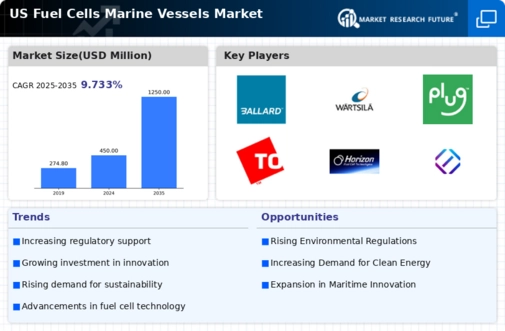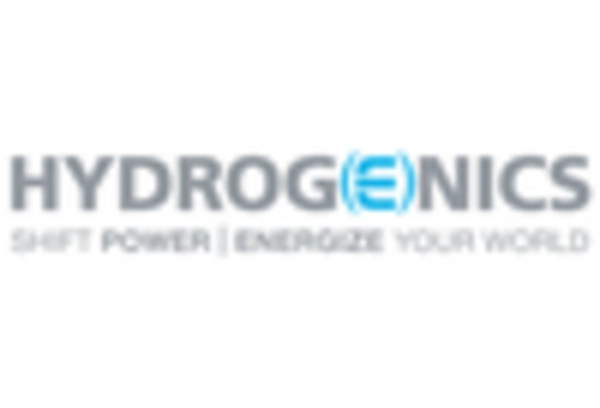Environmental Regulations and Compliance
the fuel cells-marine vessels market is experiencing a surge in demand due to stringent environmental regulations aimed at reducing emissions from marine vessels. The U.S. government has implemented various policies to limit greenhouse gas emissions, which has prompted vessel operators to seek cleaner alternatives. Fuel cells, known for their low emissions, are becoming a viable solution. According to the Environmental Protection Agency, marine vessels contribute significantly to air pollution, leading to increased regulatory scrutiny. As a result, compliance with these regulations is driving the adoption of fuel cell technology in the marine sector, as operators aim to meet environmental standards while maintaining operational efficiency.
Rising Fuel Costs and Economic Viability
the fuel cells-marine vessels market is also influenced by the rising costs of traditional fuels. As global oil prices fluctuate, the economic viability of fuel cells becomes increasingly attractive. Fuel cells offer a more stable and potentially lower-cost alternative in the long run. The U.S. Energy Information Administration reported that marine fuel prices have seen significant increases, prompting operators to explore alternative energy sources. This shift not only helps in cost management but also aligns with the broader trend of seeking sustainable energy solutions. Consequently, the economic pressures associated with fuel costs are likely to accelerate the adoption of fuel cell technology in marine applications.
Technological Innovations in Fuel Cell Systems
Technological advancements in fuel cell systems are playing a crucial role in the growth of the fuel cells-marine-vessels market. Innovations such as improved fuel cell efficiency, durability, and reduced weight are making these systems more suitable for marine applications. Research and development efforts in the U.S. have led to the creation of advanced fuel cell technologies that can withstand harsh marine environments. The National Renewable Energy Laboratory has reported that these innovations could enhance the performance and reliability of fuel cells, making them a more attractive option for vessel operators. As technology continues to evolve, the fuel cells-marine-vessels market is likely to benefit from increased adoption rates.
Government Incentives and Funding Opportunities
Government incentives and funding opportunities are significantly impacting the fuel cells-marine-vessels market. Various federal and state programs are designed to promote the adoption of clean energy technologies, including fuel cells. The U.S. Department of Energy has allocated substantial funding for research and development in fuel cell technology, which encourages innovation and lowers the financial barriers for marine operators. These incentives not only support the initial investment in fuel cell systems but also foster a favorable environment for long-term growth in the market. As financial support continues, the fuel cells-marine-vessels market is expected to expand, driven by increased accessibility to funding.
Growing Demand for Sustainable Shipping Solutions
the fuel cells-marine vessels market is witnessing a growing demand for sustainable shipping solutions. As environmental awareness increases among consumers and businesses, there is a push for greener alternatives in the shipping industry. Companies are increasingly seeking to reduce their carbon footprint, and fuel cells present a viable option for achieving this goal. The U.S. maritime industry is responding to this demand by exploring fuel cell technology as a means to enhance sustainability. According to industry reports, the shift towards sustainable practices is likely to reshape the competitive landscape, with fuel cells becoming a key component in the future of marine transportation.
















